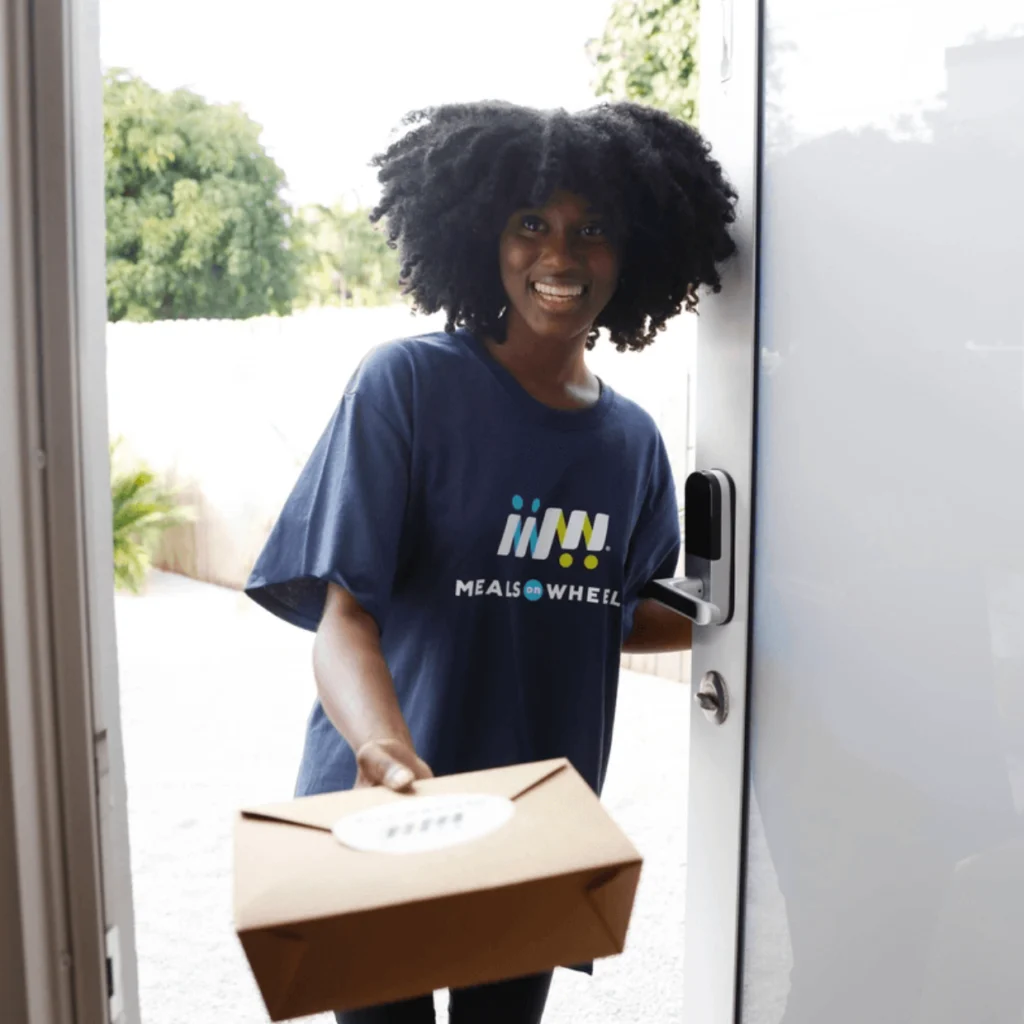Health care providers are continually looking to deliver efficient and cost-saving services, and Meals on Wheels can bring our special brand of service to your senior members. Meals on Wheels can be a valuable asset for health care providers and insurers by helping to avoid unnecessary hospitalizations and reducing hospital readmissions and post-discharge needs through daily nutrition, socialization and safety checks.
When Meals on Wheels knocks on the door, vulnerable seniors open it with a smile. Being invited into the homes of millions of the nation’s most high-risk seniors and disabled individuals is an honor and privilege. It’s also the first and one of the most effective lines of defense in avoiding additional health care costs.
Health Services
We’re able to tap into our nationwide network of local, community-based programs to serve virtually any geography in the country. Every visit comes with a nutritious meal created to address the specific health conditions of the senior, a safety check around the house and an assessment of any changes that might impact future medical needs. Meals on Wheels daily visits enable us to observe changes in condition that can help identify risks before they become problems; address problems before they become health issues; and solve health issues before they become catastrophic and costly. This can mean the difference between independent living at home and an unwelcome transfer to a costly long-term care facility.
Choose between the services below or let us customize a plan to meet your exact needs.
Long-term preventative services, including nutrition, socialization, safety checks and connections to community services.
Short-term post-discharge services, including nutrition, socialization and safety checks. Customizable depending on the needs of the provider.

Benefits of Partnering with Meals on Wheels
Years of Experience
The national Meals on Wheels network has specialized in addressing social determinants of health of the most complex senior market for nearly 50 years. Our in-depth experience adds significantly to your body of knowledge about seniors and their specific nutritional and social needs.
Change of Condition Monitoring
With regular in-person visits during meal deliveries, Meals on Wheels can track and monitor a client’s health status. Trained social workers, case workers or nutritionists may conduct an initial risk assessment with new referrals and periodic in-home assessments, acting as a first line of sight for potential dangers or changes in condition.
Community Connections
The “in community” presence of local Meals on Wheels providers enables relationship-building and connections to needed services that may help seniors stay healthier, often through other community-based organizations.
Tailored Nutrition
Local Meals on Wheels providers can offer a wide variety of daily hot or chilled meal types, including medically tailored and meals tailored to meet cultural preferences that reflect the community. Home delivery of frozen meals is also available everywhere in the continental U.S.

Reducing Costs While Improving Health Outcomes
Cost Savings
- Post-discharge costs on a PMPM (per member per month) basis were reduced by 31% in a Medicare Advantage pilot that was then scaled to serve more than 135,000 people receiving Meals on Wheels across 36 states.1
- Average monthly health care costs were reduced by more than $10,000 per member, and average monthly inpatient costs were reduced by almost $53,000 after three months of Meals on Wheels services.2
- We can serve a senior Meals on Wheels for a whole year for about the same cost as 10 days in a nursing home or 1 day in a hospital.
Member Satisfaction
- 93% of Meals on Wheels clients in the Medicare Advantage pilot, referenced above, reported satisfaction with delivery of food, and 92% were likely to re-enroll with their health plan following service.
- Meals on Wheels services contribute to direct improvements in triple-weighted Star Ratings and other critical ratings, including: plan readmissions, diabetes care – blood sugar controlled, controlling blood pressure, care coordination, reducing the risk of falling, improving or maintaining self-related health, improving or maintaining mental health.3
Health Improvement
- Almost all Meals on Wheels clients report eating healthier (85%), improvements in health (84%) and feeling better (90%) after receiving home-delivered meals.4
- The rate of seniors reporting a “well-nourished” nutritional status more than tripled after two months of receiving Meals on Wheels service (from 8% to 29%).5
- Seniors reported to be “malnourished” decreased substantially (from 34% to 6%) after two months of Meals on Wheels service.6
- Brown University’s major More Than a Meal study showed that participants receiving daily delivered meals were more likely to report: improved mental health (e.g., anxiety), improved physical health, fewer falls, reduced feelings of isolation and loneliness, and reduced worry about being able to remain at home.7
- Other studies show that loneliness and isolation have comparable impact to obesity, substance abuse and smoking 15 cigarettes a day. Loneliness is also associated with increases in heart disease, stroke and high blood pressure.8
Brand Favorability
- The general public trusts Meals on Wheels.
- 90% of the general public is aware of the brand, reporting 90% brand favorability.9
- Seniors trust Meals on Wheels and feel comfortable inviting staff and volunteers into their home, discussing and disclosing physical and mental health conditions/issues to staff and volunteers who are trained to do with such information.
Partner With Us
To learn more about how Meals on Wheels Health and our nationwide network can provide cost-effective health care solutions, contact Ipyana Spencer, Chief Health Officer, Meals on Wheels Health
Citations
- Miller, Gail. Presentation before Aging Options in Aging Conference sponsored by the Administration on Aging, December 2006.
- Gurvey, J., Rand, K., & Daugherty, S. (2013). Examining health care costs among MANNA clients and a comparison group. Journal of Primary Care and Community Health, 4, 311-317. DOI: 10.1177/2150131913490737.
- Meals on Wheels America, with Thomas, K., Dosa, D., Brown University. More Than a Meal Study 1, 2015.
- Meals on Wheels America. 2017. Hunger in Older Adults: Challenges and Opportunities for the Aging Network.
- Wright, L., Vance, L., Sudduth, C., & Epps, J.B. (2015). The impact of a home-delivered meal program on nutritional risk, dietary intake, food security, loneliness, and social well-being. Journal of Nutrition in Gerontology and Geriatrics, 34, 218-227. DOI: 10.1080/21551197.2015.1022681.
- Wright, L., Vance, L., Sudduth, C., & Epps, J.B. (2015). The impact of a home-delivered meal program on nutritional risk, dietary intake, food security, loneliness, and social well-being. Journal of Nutrition in Gerontology and Geriatrics, 34, 218-227. DOI: 10.1080/21551197.2015.1022681.
- Meals on Wheels America, with Thomas, K., Dosa, D., Brown University. More Than a Meal Study 1, 2015.
- Holt-Lunstand, J., Smith, T.B., & Layton, J.B. (2010). Social relationships and mortality risk: A meta-analytic review. PLoS Med, 7(7), e1000316; Valtora, N.K., Kanaan, M., Gilbody, S., Ronzi, S., & Hanratty, B. (2016). Loneliness and social isolation as risk factors for coronary heart disease and stroke: Systemic review and meta-analysis of longitudinal observational studies. Heart, Published Online First: 18 April 2016. DOI: 10.1136/heartjnl-2015-308790; Hawkley, L.C., Thisted, R.A., Masi, C.M., & Caioppo, J.T. (2010). Loneliness predicts increased blood pressure: 5-year cross-lagged analyses in middle-aged and older adults. Psychology and Aging, 25, 132-141. DOI: 10.1037/a0017805.
- EXCEL SSRS/Social Science Research Solutions Omnibus Study. October 2013.
